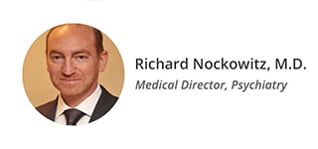Avoiding Opioid Addiction
Updated August 2020
[This article was written with Dr. Richard Nockowitz, Medical Director of Psychiatry for Amwell]
We are currently living in the deadliest drug crisis in American History. About ninety Americans die every day due to opioid overdoses – more daily fatalities than car accidents. In 2014, the United States hit a record number of deaths due to reported drug overdoses from prescription pain relievers and heroin. In 2015, 33,000 people died from opioid-related overdoses. Now it’s 2017 and these numbers have continued to increase. With no end in sight, President Trump has officially declared the opioid crisis a public health emergency.
Why does there continue to be an upward growth curve for these statistics? For starters, opioids and opiates are found in illegal drugs such as heroin but are also used in many legal prescription medicines to reduce pain to the brain. Opioids are easily misused and can quickly lead to addiction and indeed, many patients are often unaware they are slowly becoming addicted as usage persists. If these prescription drugs are not taken as recommended by a doctor, they can be extremely dangerous and lead to an unknown addiction.
With such alarming trends toward unintended misuse, Amwell has prepared a list of the top four things you should know to avoid opioid addiction:
- Get educated
Many people don’t even know they are struggling with addiction. How do you know if you might have a problem? You are likely addicted to opioids when you notice physiologic withdrawal symptoms. If you crave or miss the medications or notice any changes in your behavior or decision making due to wanting more of the medication, or have problems financially, at work or in your relationships, it could be a sign of withdrawal. If these symptoms seem strangely familiar, set up an appointment with your primary care doctor, or you can seek out advice from a physician or psychiatrist on Amwell.
- Use only for short-term pain
In most cases, opioids are not intended to be used in a long-term treatment plan. Extensive usage of pain medications can lead to a quicker and more severe addiction. If patients build up a tolerance to a medication or progressively seek larger doses, it can indicate an addiction. To avoid addiction, these pain medications should be taken as directed by your doctor. If opioids are properly used and taken over a short period of time, they can be extremely helpful or potentially lifesaving.
- Know the warning signs
It is important to be familiar with the warning signs of opioid addiction. Knowing these warning signs could potentially save a friend, family member, or even yourself. These signs can include, but are not limited to:
- The disappearance of prescription drugs
- Changes in friends
- Increased secrecy
- Confusion
- Drowsiness/sedation
- Constricted pupils
- Slowed breathing
- Frequent borrowing of money
- Seek help
Whether you or a friend or family member have been affected by this epidemic, there is help available. Dr. Richard Nockowitz, an Amwell behavioral health physician, believes, “the key thing is acknowledging the issue and reaching out for help. Help is available and effective, but the person needs to take the step. If you think you have a problem, look to your loved ones as a support system and ask for encouragement throughout the process.” If you are concerned there could be a problem, have a conversation with your counselor or see a doctor on Amwell from the privacy of your own home.

Check out the post on Facebook